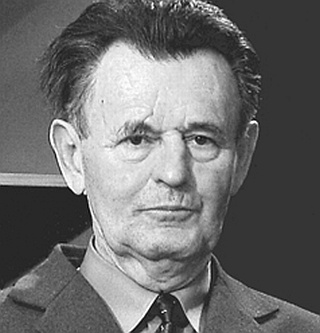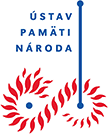Karol Noskovič (1933 - 2011)

Biography
“The State Security then started to play such a game against us
that today the mind boggles at it.”
Karol Noskovič was born on March 8, 1933, in the village of Viničné (Pezinok district) in the Malé Karpaty (the Little Carpathians). His parents came from a small peasant family and raised him to be a good Catholic. He started attending the elementary school in his home village in 1939. At that time he became interested in theatre and sports. In 1944 he enrolled at the grammar school in Svätý Jur, but as it was in the time when the Slovak National Uprising broke out, the conditions for school teaching became very difficult. Later, his father inherited a piece of land and started working for a grain processing company and owing to his own efforts and abilities he managed to earn a living and build a house. However, in 1946 the company was closed down and Karol’s father was employed in a company engaged in purchasing activities. Soon after the communist takeover he became aware that the coming years wouldn’t be easy for them at all. As a young boy, Karol disapproved of the incoming collectivization process and, as he was witness to the unjust persecution of believers and the outrageous power attitude of party and local authorities to his family, he and some of his friends from the village decided in April 1951 to write an anti-state leaflet. There he denounced the communist ideology and also the fact that many Slovaks ended up in forced labour camps and in prisons for their religious belief. Apart from printing leaflets the group, which called itself Mladé Slovensko (Young Slovakia), intended to transmit critical messages through their transceiver. However, they got in touch with a collaborator of the State Security. In the meantime Karol continued his studies and, as he wanted to become a teacher, he moved to a pedagogical grammar school. He was arrested on Thursday, September 13, 1951, by the security forces when he was on the way home from Bratislava and he was driven to a remand centre. The members of the State Security didn’t hesitate to apply various cruel methods during the interrogation. When he was beaten up, he was transferred to Leopoldov prison, where the brutal interrogation and physical and mental pressure continued. Based on the fabricated record, Karol Noskovič was accused of the high treason and the State Court in Bratislava sentenced him on April 22, 1952, to six years of imprisonment, ten-year loss of his civil rights and forfeiture of his whole property. He passed through many prisons such as Ilava, Jáchymov, Příbram and Leopoldov. There he faced the guards’ grudge against convicts, the company of various felons, but also cold and hunger. When Karol had served part of his sentence, he was released from prison owing to his mother’s request and the fact that his father had been imprisoned as well. Right after being released he served in the military service without using a gun in the Auxiliary Technical Battalion in Ostrava. When he returned from the auxiliary technical battalion, he got married and was employed as a manual worker. However, his totalitarian past haunted him for many succeeding years. From November 2004 to February 2008 he worked as a chairman of the Confederation of Political Prisoners of Slovakia and from March 2008 until his death he was its vice chairman. In the years 2003 – 2009 he was a member of the Board of Directors of the Nation’s Memory Institute. In September 2008 the President of the Slovak Republic granted him the Third Class Order of Ľudovít Štúr for his exceptional credits in the field of democracy and human rights. A pious memorial for the unjustly and wrongfully imprisoned in Leopoldov was held on August 27, 2011. There, Karol Noskovič was granted the Commemorative Medal of the 3rd Resistance Movement by the Confederation of Political Prisoners of the Czech Republic; however, he wasn’t able to be there to receive it. He died on September 6, 2011.
Disapproval of the Regime Expressed in the Leaflet
“Some kind of evil appeared here after the glorious events of February 1948 and we didn’t like it. We started to meet together; we, the Christian boys who had objections to what was about to come, as the forced collectivization, etc.
We never wanted to fight violently against it, we used just those leaflets. We believed that like in theatrical performances there is a real fight between good and evil, where at last good wins. When we started to print the leaflets, I said to the boys: ‘Guys, beware. Don’t say anything to anybody, because we may end up in trouble. We have heard about many people who were arrested. We don’t want much; we just want to do our bit as for the fall of this awful regime that has just begun.’ Unfortunately, it lasted more than forty years from that point on.”
“Agent among us”
“An agent Holič intruded into our circles as he came to our pub and boasted to be a member of some big Bratislava group. One of my friends got trapped by his speech. As this eighteen-year-old boy didn’t need much, he got drunk easily and began tattling, because he trusted him. It was the biggest mistake that he trusted him. Since then we all were continuously monitored. We focused on rehearsing another performance, but as we were about to perform it, the director who became a Party’s secretary came and forbade it. Another reason also was that the community centre had been taken from the Church and then attached to the school as a gym.
After some time, Holič contacted us through a friend again. This friend came to our yard and said: ‘On the second Sunday in September there will be a harvest home, so we need some leaflets or at least some posters there.’ And that was the only source of evidence they had to accuse us of the anti-state activities. Just because of this one little leaflet they named it high treason.”
Prepared to Die
“They seated me on the chair and tied me to it like this, so that I couldn’t move. They put my legs on another chair and started to hit them. Another man battered me on my face. They switched with one another when they got tired and continued to beat me. I was bleeding; I was all bloody. Of course, they still wanted me to confess that I went to the rehearsal of our anti-state organization, where we should have prepared more leaflets, or even new articles for the purported broadcast, which actually never turned out for real. They yelled at me: ‘You will die, you will conk out!’ Well, I expected they might even shoot me. I swear it was like that. I thought to myself: ‘I have never done anything wrong in my life.’ But as a Catholic I supposed it was meant to be like that. I was prepared to die.”
Prison Corridors, Towels on Eyes
“I see these halls now for the first time in my life. I have never seen them before. I was always wearing dark glasses; if they were short of them, they wrapped towels around our eyes. This way they walked us down these halls and those stairs to the interrogation rooms. The physical torture included also a squat walk until total exhaustion and pencils between the fingers, however, they crushed me even more psychologically.”
Stay in the Solitary Cell, Mental Torture
“During the whole night the light in the cell was on. We actually couldn’t fall asleep. And after all in the cell there was just bare floor and we all were tangled up in one blanket, so everything hurt us as we laid there. Indeed, the sleep was so light that anytime they wanted, they could easily wake us up and take us for the interrogation. Then during the night they started telling me how they were going to kidnap my parents into Siberia and how I would never see them again. It was all great injustice and the whole record was fabricated from all the testimonies, which was only to our detriment. This was completely devastating for me. I was desperate, because I was in solitary confinement for 110 days. Alone, alone, alone… That was real psychological torture. I was used to having company, fellowship, to be with my friends, parents and here I was alone… But anyway I hoped that at court the truth would be revealed. Unfortunately, after being sentenced to six years, I had to be glad I survived. That was the most important – I was alive. The fears of being hung, of being killed were gone. I hoped I would live and survive also the hard work at labour camps, even though I knew nothing about Jáchymov, about what awaited me there or where exactly I would be placed. So I’d say all these doubts stopped after the trial.”
Christmas Present - Mother’s Poppy Seed Cake
“I love to recall this Christmas more than any other Christmas, because I received a parcel with poppy seed cake. I said to myself: ‘Nobody else could have baked this cake but my mom.’ This was before the trial and it was such a release for me. This way I knew my parents were at home and not somewhere in Siberia. Moreover, that evening we had a challah and suddenly we even heard Silent Night, Holy Night sung in the distance. Probably there were some women in the laundry room singing this song. Anyway, my parents were able to send me that parcel and I was very happy they were alive.”
Trial or Mockery?
“The whole trial was just a mockery because they were truly blaming us for being the biggest enemies and criminals, and supposedly; we were also the instigators of the World War III. It is absurd when one is reading today what they wrote into the records. There were things we didn’t even mention at all. Even though we all admitted we were against the socialist system, certainly, none of us explicitly expressed that fact.”
Leaving for Jáchymov
“After two - three months they placed us into two busses and we went throughout the whole former Republic to Jáchymov. Back then they deployed political prisoners after the German captives to mine uranium ore for our Soviet brethren. The temperature in Jáchymov was about -20 to -30 °C (-4 to - 22°F). The Ore Mountains are very cold. And imagine we were wet while mining. There were no holidays, no Sunday breaks for us.
On Sundays they started playing a folk song and during the song they announced: ‘Carpenters and bricklayers, line up for the Sunday shift, I repeat…’ They didn’t expect anyone to go back home from there. They supposed we will drop dead. But I guess a man truly endures even more than an animal can.”
Hunger vs. Human Dignity
“We were hungry all the time, of course. Once I went to the kitchen and asked whether they could find something for us, at least a piece of bread. There was one Slovak, a lawyer, poor guy, really starved out! He didn’t have any human dignity left as he was tossing bones full of worms and licking them. Then I said to myself: ‘I will rather die than do this.’ This was one of the most horrible experiences I had there.”
The story and videoclips of this witness were put together and published thanks to the financial support of EU within the programme Europe for Citizens – Active European Remembrance.

